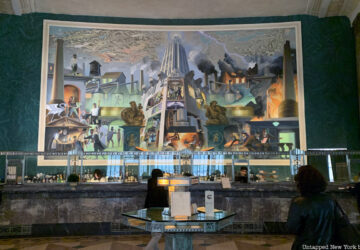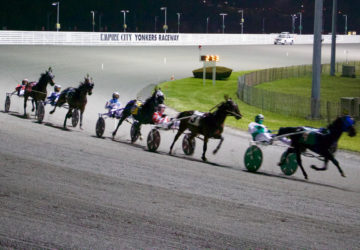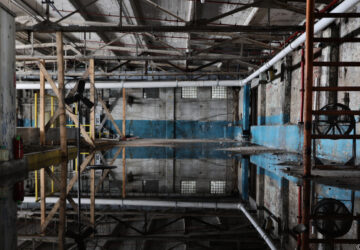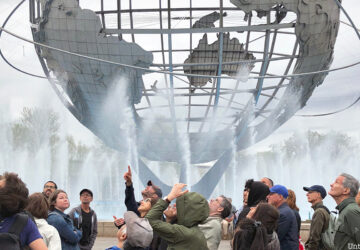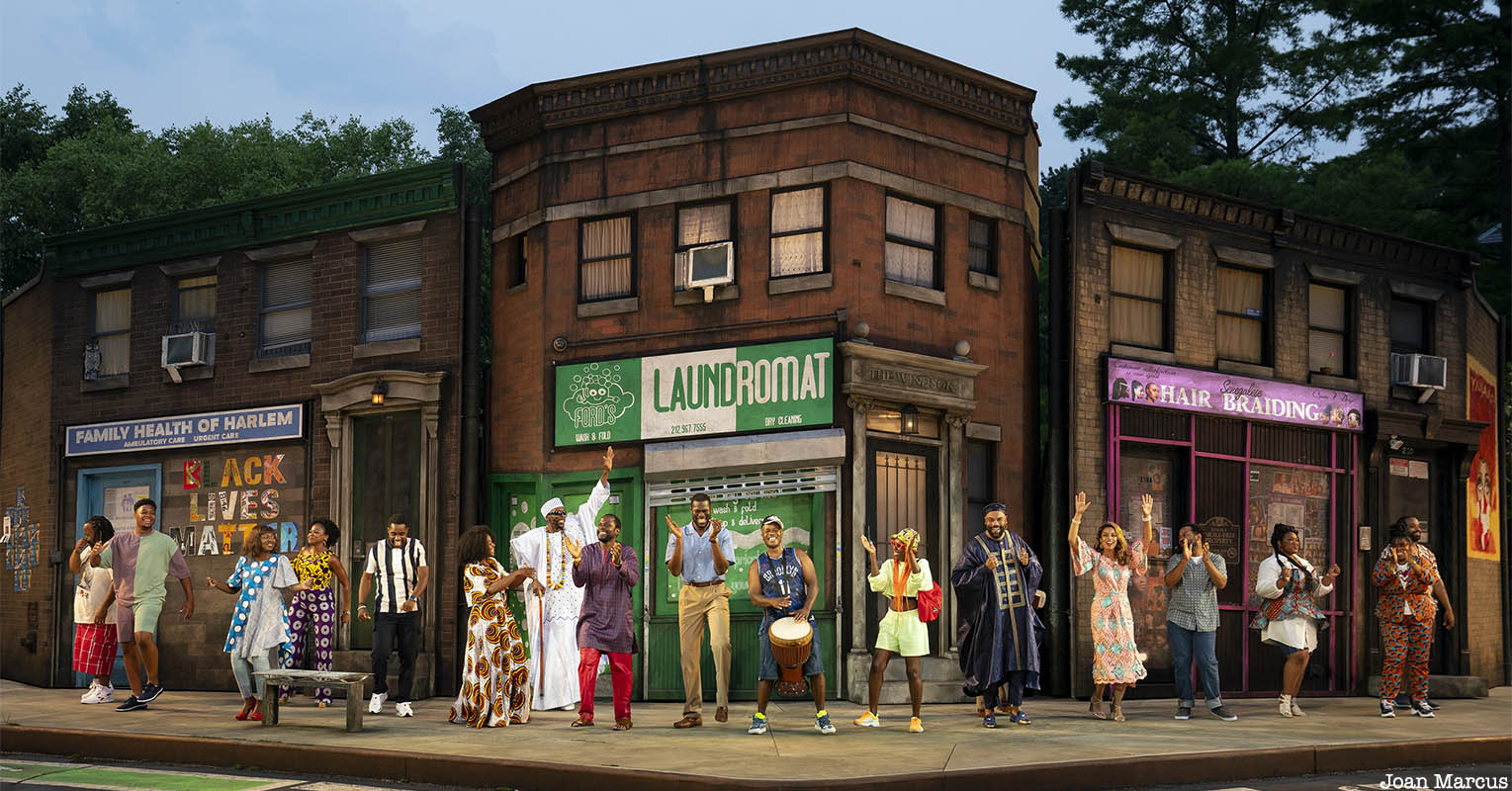In the nearly six decades since producer Joe Papp dragooned Parks Commissioner Robert Moses and New York Mayor Robert F. Wagner into allowing an annual theatrical production of Shakespeare in Central Park, The Public Theater had never missed a season until Covid in 2020. Sixteen months later, any re-opening play had to be simultaneously exuberant, true to Shakespeare, and shrewdly New York. Thus the choice of Merry Wives, directed by Saheem Ali and adapted by Ghanaian-American playwright Jocelyn Bioh from Shakespeare’s minor work. They transform an unpopular saga of revenge into a rowdy, lovable comedy of forgiveness. It has become a play for our time and our city.
Merry Wives Celebrates African New York
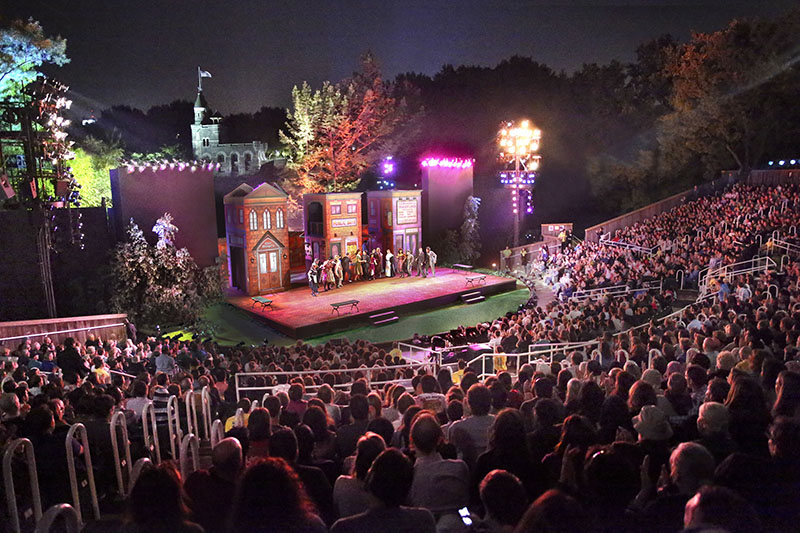
“Oh my God, it’s my neighborhood,” said Harlem resident James Ervin as we emerged from the Delacorte’s ramp into the sunlight of a lovely Saturday evening. There before us in Central Park was a classic row of late 19th-century buildings, still handsome but aging, slightly askew, cornices intact but shaky, multi-colored bricks mixed with concrete blocks. We knew where we were, which was set designer Beowulf Boritt’s goal. “The set has to establish location,” he says, “but also convey context. A Shakespeare in the Park set needs to do a lot of things the script normally handles, like suggest socio-political information. Shakespeare’s script doesn’t support the idea that we’re in a Harlem of African immigrants. So the set must do a little more lifting than usual.”
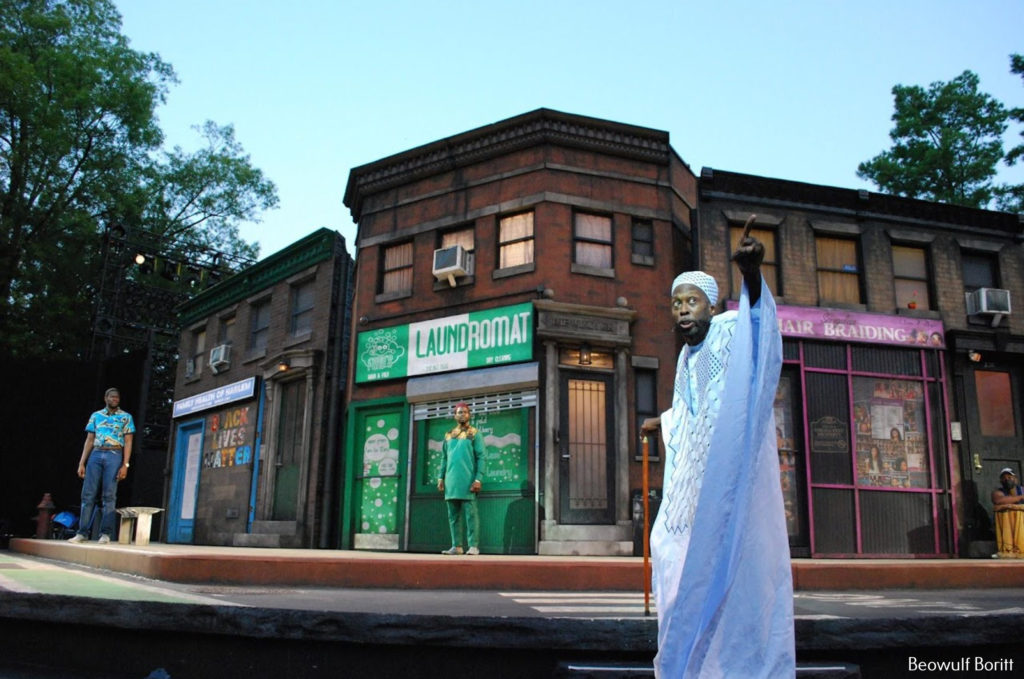
And lift it does, telling us we’re in the striving, thriving, upwardly mobile world of West African immigrants on 116th Street. Le Petit Sénégal or Little Senegal, between 7th and 8th Avenues, full of immigrants from Ghana, Nigeria, Burkina Faso. Somalia, Sénégal. Small businesses—a family clinic, a laundry, and a hair-braiding salon—inhabit the ramshackle ground floors. Colors are big and bold—as big and bold as the characters, says Boritt. A mosaic Black Lives Matter street mural dominates a storefront.
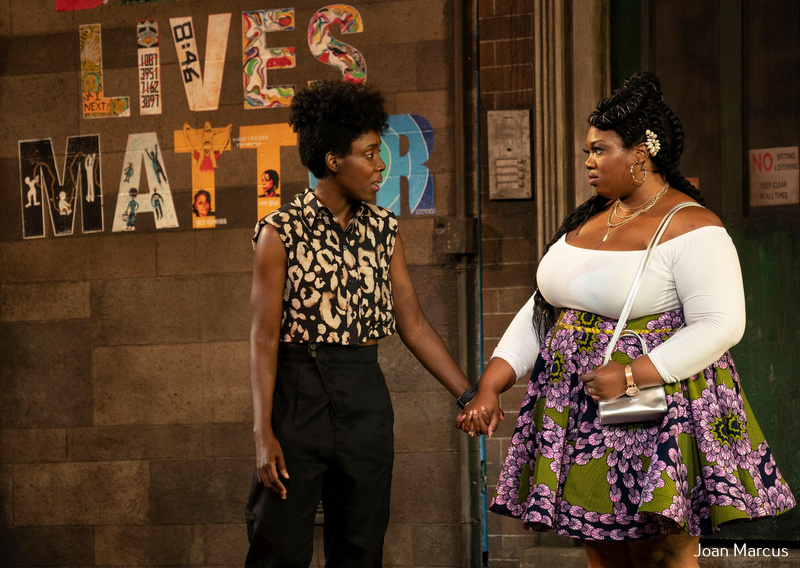
Housing pros will relish the tenement details—a pipe sticking out of the side of a building and conduits running up the front. “New York is constantly reinventing itself,” says Boritt, “introducing new things without getting rid of anything underneath. We have dirt and rust oozing from the air conditioners, and we put random weird hardware on the buildings. There’s an odd clamp, for example. God knows what it did originally.”
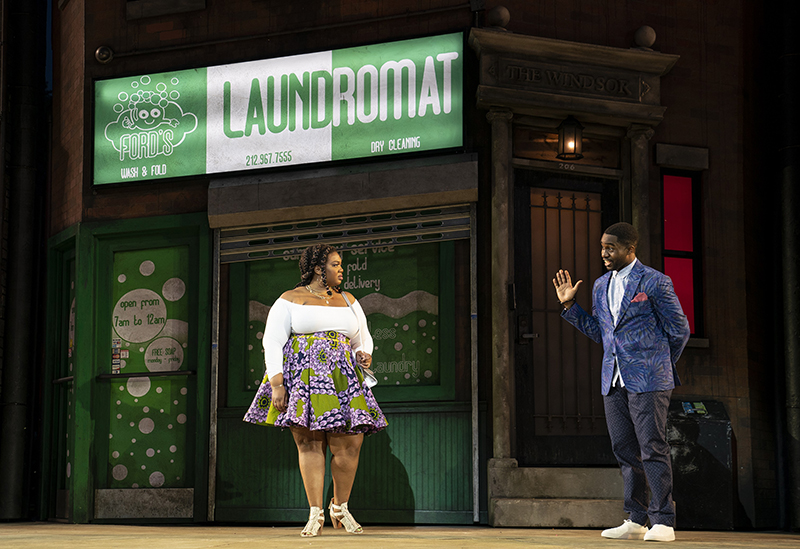
The costumes convey the context as well. Ghanaian-born designer Dede Ayite told the New York Times that she and her team sourced fabrics from Kumasi, Ghana, along with fabric haunts in Yonkers and the Bronx. She hoped the costumes would add to the production’s celebration of Harlem and other immigrant communities. Surely this is the first time Ghana’s celebrated kente cloth has appeared on the Delacorte stage. The costumes help move the story forward by immediately letting us know, as Boritt points out, which characters are immigrants and which are African-American. All eighteen performers by the way are of African descent.
Convivial Drummer
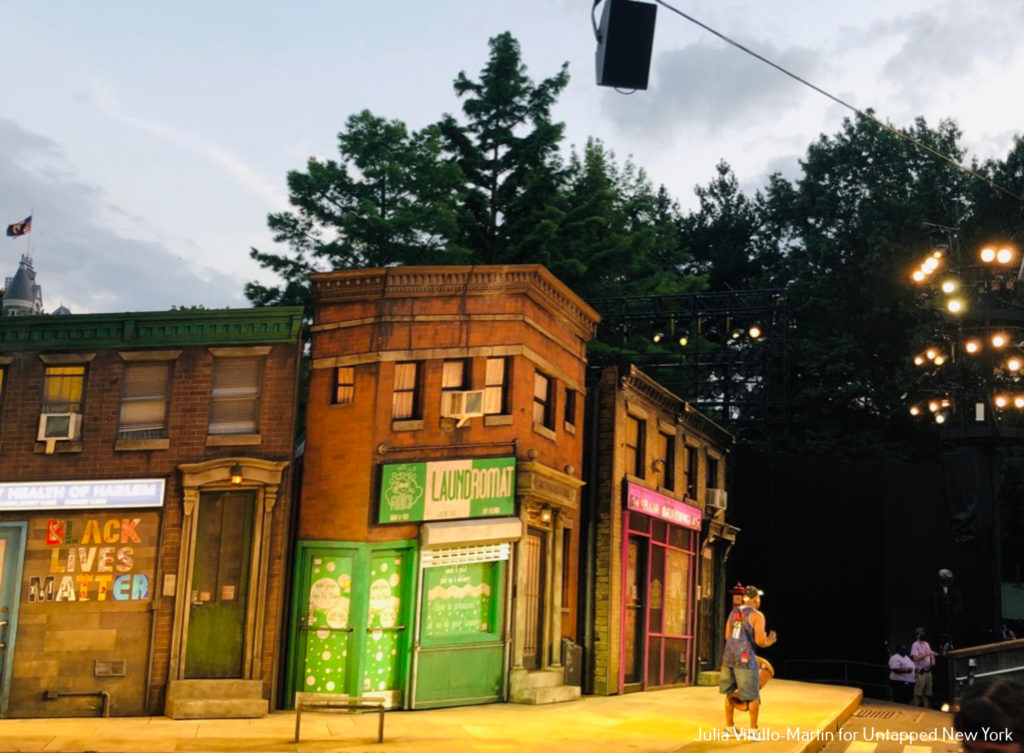
A drummer—the cheerful Farai Malianga from Zimbabwe—was on stage as audience members entered the Delacorte. This took a while since people had to present proof of vaccination as well as their tickets. Malianga drummed casually for a bit, getting his audience in the mood, and then switched to a rhythm challenge, a friendly call and response. He drummed a rhythm and we clapped. He began with simple phrases but soon upped the ante.
One thing was clear: We were about to have an Africa-in-NYC evening. “It was great they started with the drummer,” said Ervin, a professional dancer.. “The drumming energized the audience and reminded us of our African roots, setting us up for the evening, Plus drumming is something you see in contemporary Harlem, tying today to the past.” We had a long wait, but with remarkable drumming on stage no one got restless.
King of New York
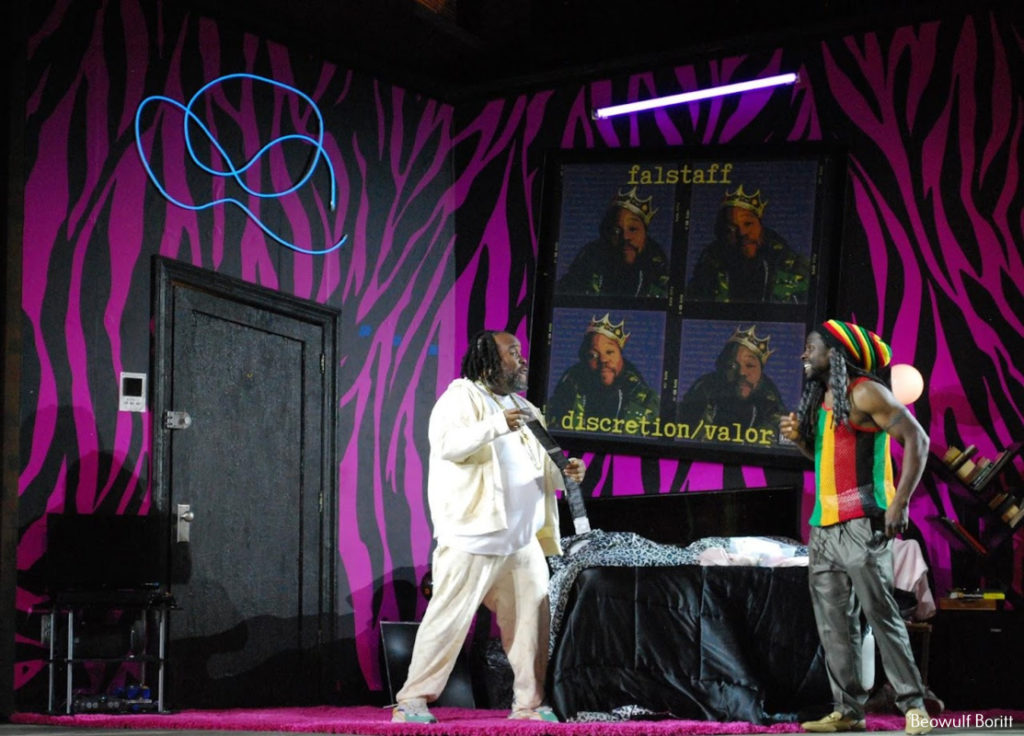
With his oversized ego, his appetite for life, and his unique sense of style, this Falstaff (an adorable Jacob Ming-Trent) is outrageously shown on set as a Biggie-Smalls-like King of New York. He doesn’t have to so much as move for us to sense his swagger. Boritt has cleverly labeled the poster “discretion/valor” after Falstaff’s famous line, ‘the better part of valor is discretion.’ But this Falstaff has neither discretion nor valor. Why should he? A slacker, he’s broke, has a “portly belly,” drinks too much, and has few prospects. Yet he has a cool Harlem pad with purple Zebra-striped walls, pink shag carpeting, and some kind of sexy black leopard and satin duvet. Since a cool apartment can get you far in New York he thinks he’s hot stuff, boasting that he will seduce his glamorous, wealthy West African neighbors: “I will be cheaters to them both, and they shall be sugar mamas to me; We’re gonna have the Ghanaian AND the Nigerian jollof rice!”
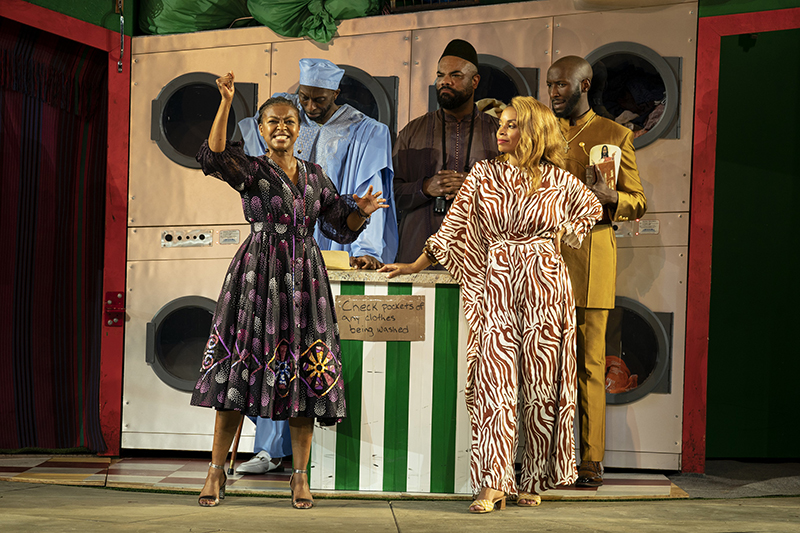
But it all goes hilariously wrong at the laundromat as the ladies convince him to hide from their husbands by climbing into a ludicrously small laundry basket, with “the rankest compound of villainous smell that ever offended a nostril.” The basket is pushed to the river, where Falstaff is dumped into the Hudson (the original Thames said to be every bit as foul). He emerges through a faux cast-iron manhole cover, out of breath—it’s a long way, says Boritt, from the ground under the stage to the surface. He’s triumphant but filthy. His huge size meant he had had “a kind of alacrity in sinking.” The audience roared its love.
“It’s been a long, hard year,” says Falstaff.. “Couldn’t go to the clubs. Couldn’t hit up the bars. Liquor stores was closed all early. Been stuck in the house just eating snacks. Watching Netflix. Bored out of my Got-damned mind! So can you blame me for tryna get with Madam Page and Madam Ford? Those are some Merry Wives. You feel me?” We felt him.
“What cannot be eschewed must be embraced”
Not everything works in Merry Wives. Some important Shakespeare speeches are cut, replaced with political exhortations Shakespeare would not have made—and didn’t. Published in 1602, when Queen Elizabeth I was dying and England was in upheaval, Merry Wives was a rollicking but judicious play. Shakespeare would not have written Mama Quickly’s lines: “Now is the time for the reformation/ Now is the time to rebuild the nation!” He would have ended up in the Tower.
But what does work is the conversion of the handsome, young suitor, Master Fenton, to Mistress Fenton, who wins the heroine in marriage. Master Page speaks the well-known words in their new context, “What cannot be eschewed must be embraced,” and all is well.
Central Park is the Set
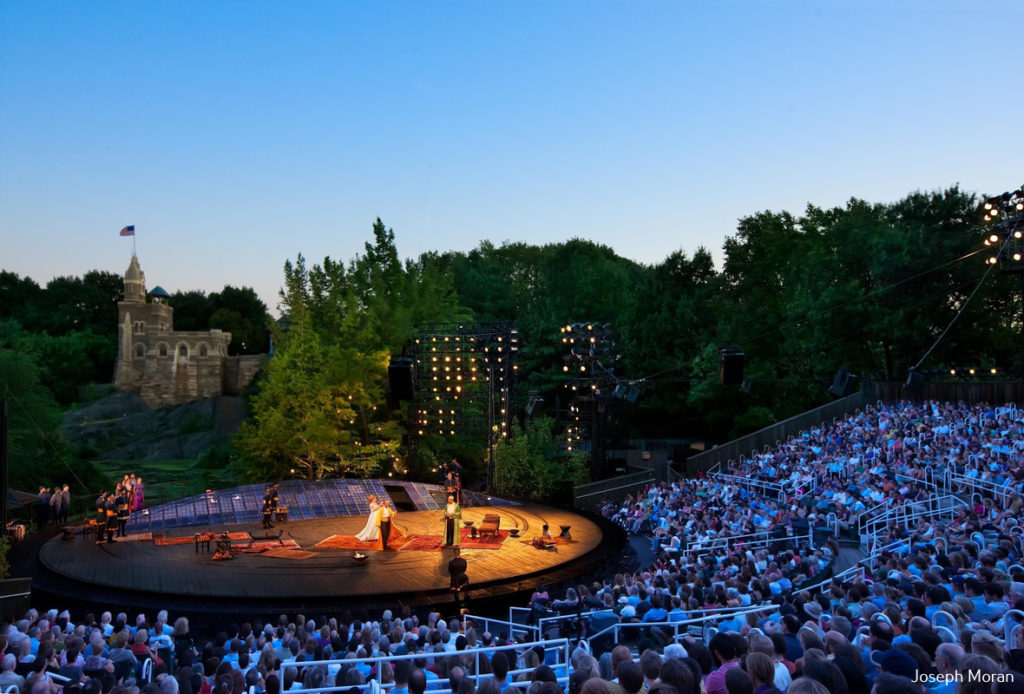
The challenges of Shakespeare in the Park are many—the headaches, the heartaches, the backaches, the flops. There’s Shakespeare himself, whose words are now some 400 years old. Then there’s the magnificent park, whose boisterous life goes in the near background even as Shakespeare is performed. Ball games continue on the Great Lawn. The hated tourist helicopters from New Jersey hover overhead as low and noisily as possible. “When you do a show in Central Park,” says Boritt, “the park is part of your set. It can’t be ignored. It has to be respected. The trees. The sounds. The lake.” Even the raccoons have to be respected, as Falstaff comments nervously when looking for a place to hide. Ducking under the stage is out because “them raccoons down there don’t play.” Boritt says mother raccoons move into the Delacorte over the summer to have their babies. “We make a lot of noise as we approach.”

For the finale, described by the script as “a big old African wedding celebration,” the set breaks away, exposing romantic Belvedere Castle, making it part of the fantastical evening to come. Everyone sings and dances joyously., many in grass skirts and red ceremonial masks. As Ervin notes, “Good close with a traditional African dance, which presented a reimagined Harlem—not necessarily what you would see today but in the spirit.”
Merry Wives closes September 18 Free tickets are distributed entirely via an advanced digital lottery hosted by GOLDSTAR.
Julia Vitullo-Martin can be reached at @JuliaManhattan.
